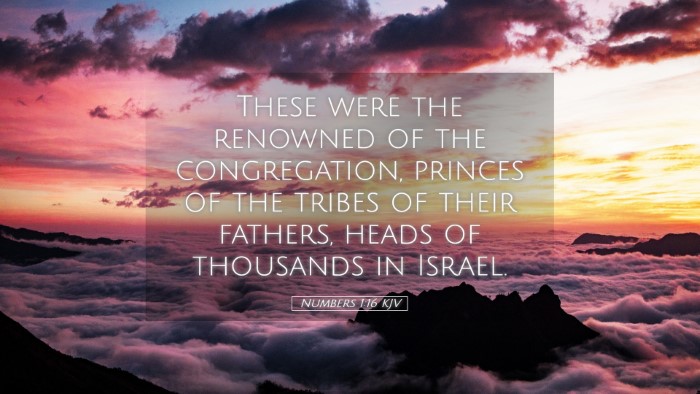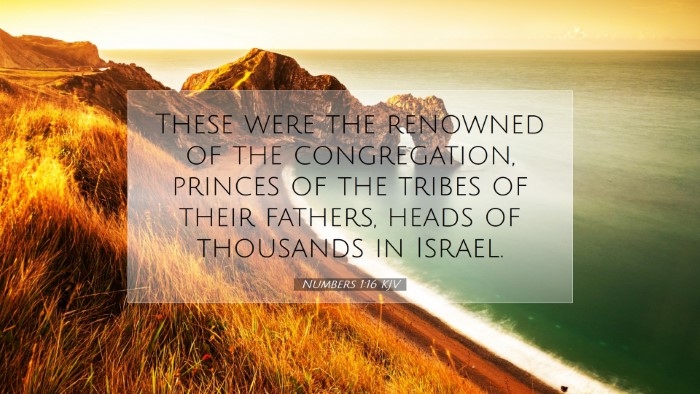Commentary on Numbers 1:16
Verse: "These were the renowned of the congregation, princes of the tribes of their fathers, heads of the thousands of Israel." (Numbers 1:16)
Introduction
The book of Numbers serves as a historical account that provides insights into the organization, journey, and governance of the Israelites during their wandering in the wilderness. Numbers 1:16 focuses specifically on the enumeration of key leaders among the tribes of Israel. This verse proclaims the significance of appointed leaders who were recognized as renowned and distinguished individuals within the community. In this commentary, we will draw insights from renowned public domain commentaries by Matthew Henry, Albert Barnes, and Adam Clarke.
Exegesis
In this verse, the term “renowned” suggests a level of respect and honor attributed to these leaders. They were not only heads of their families but also representatives of the tribes, fulfilling vital roles in the societal structure of the Israelites.
Matters of Leadership
- Matthew Henry: Matthew Henry observes that these leaders were chosen based on their ability to command respect and authority, emphasizing the importance of exemplary characteristics in leadership. He notes that their renown was not only a result of their lineage but also their competence and reliability in guiding their people.
- Albert Barnes: Barnes highlights that these "princes of the tribes" illustrate the notion of collective responsibility within the nation of Israel. Each leader was accountable for his tribe’s welfare and had the duty to uphold the laws and values of the community. Barnes further comments on the involvement of these tribes in the larger narrative of Israel's journey, shaping their identity and purpose.
- Adam Clarke: Clarke points out the importance of recognizing leadership in the context of divine approval. He underscores that these leaders were not merely chosen arbitrarily; rather, their appointment was indicative of God's sovereign will in establishing order and hierarchy among His people.
The Significance of Tribes
The designation of the leaders as “princes” resonates deeply within the cultural and theological frameworks of the Israelite society. Each tribe represented a unique heritage and a vital role in the collective identity of Israel.
- Cultural Identity: Each tribe could trace its lineage back to the sons of Jacob, establishing a connection to the patriarchal promises. This highlights an essential aspect of identity and connection in the Israelite community.
- Spiritual Representation: These leaders acted as spiritual representatives, guiding their people in matters of faith and practice, embodying the covenantal relationship with God.
- Physical Organization: The structuring of tribes under notable leaders facilitated order and direction as they journeyed through the wilderness, showcasing the need for organized community in times of transition and uncertainty.
Implications for Today
The leadership model presented in Numbers 1:16 has lasting implications for contemporary communities of faith. Leaders today can draw from several principles reflected in this verse:
- Integrity and Renown: Just as the leaders were recognized for their integrity, modern leaders must cultivate reputations that reflect their character and reliability in guiding their communities.
- Collective Responsibility: Leadership is not solely about authority; it encompasses a shared responsibility for the health and direction of the community. This principle is vital in church governance and community service.
- Divine Calling: Understanding that leadership is a divinely appointed role encourages leaders to seek God’s guidance in their decision-making processes and to remain humble before those they serve.
Conclusion
Numbers 1:16 encapsulates crucial insights about leadership within the community of Israel. The diverse roles played by these leaders, characterized by their renown and spiritual authority, provide a framework for understanding how God organizes His people. As contemporary pastors, students, theologians, and Bible scholars reflect on this passage, they are prompted to fathom the depth of God's call for leadership, the importance of community, and the divine influence in guiding His people. In studying these principles, we can aspire to foster a leadership paradigm that honors God and effectively serves the community.


